Best Practices Articles

Harness the Power of Affiliate Marketing Automation: Amplify Your Brand and Reduce Marketing Costs
Introduction
In the dynamic world of digital marketing, affiliate marketing has emerged as a powerful tool for businesses. Whether you’re a B2C or B2B company, affiliate marketing can substantially amplify your brand’s reach, reducing the cost of leads and expanding your global presence. This article explores the intricacies of affiliate marketing, including its benefits, its role in overseas expansion, and the different types of affiliates in the B2B area. We’ll also touch on affiliate marketing automation software and the cost-saving potential of commission-based affiliates.
Building Relationships with Affiliates
Affiliate marketing involves fostering relationships with third-party organizations or individuals who can promote your brand to their audiences. This strategy generates brand awareness and demand for your products or services.
There are two types of affiliates: transacting partners and non-transacting partners:
- Transacting partners: These affiliates are third-party organizations or individuals who sell a product or service on behalf of a vendor. They act as resellers or distributors, facilitating transactions between customers and vendors. Transacting partners typically earn a commission or a percentage of their sales. They play an active role in the sales process, handling the inventory and providing the service associated with the product.
- Non-transacting partners: Unlike transacting partners, non-transacting partners primarily focus on promoting a brand rather than directly selling products or services. They include brand ambassadors, influencers, and affiliates. These affiliates do not carry inventory or provide a service but instead leverage their platforms, audiences, or networks to promote their affiliated brand. They create awareness and generate demand for the brand’s products or services. They often earn a commission or fee based on the traffic, leads, or conversions they drive to the brand.
It’s important to note that non-transacting partners, including brand ambassadors, influencers, and affiliates, can significantly amplify a brand’s reach and increase brand awareness through their promotional efforts, even though they don’t handle sales directly. Their influence comes from their ability to engage and connect with their audience, leveraging their credibility and trust to endorse and recommend the brand.
Cost Reduction through Affiliate Marketing
An affiliate can drive leads to a brand’s website through various methods and strategies. Here’s a detailed explanation of how this process works:- Affiliate promotion: Affiliates leverage their platforms, networks, or audiences to promote a brand’s products or services. They may write reviews, create content, share links, or use other promotional techniques to attract their audience’s attention and drive them to the brand’s website.
- Affiliate links and tracking: Affiliates use the brand’s unique affiliate links to track the traffic they generate. These links contain a specific identifier that allows the brand to attribute the lead or sale back to the affiliate who referred the visitor. When someone clicks on an affiliate’s link and lands on the brand’s website, the affiliate network tracks this referral.
- Content marketing: Affiliates often create valuable content such as blog posts, videos, or social media posts related to the brand’s niche or products. Affiliates can attract potential customers interested in the brand’s offerings by providing helpful information, recommendations, or insights. The content can include affiliate links that direct readers or viewers to the brand’s website.
- Email marketing: Some affiliates have email lists or newsletters, and they can promote the brand to their subscribers through email marketing campaigns. They may send newsletters featuring the brand’s products or services, exclusive deals or discounts, or other relevant information to entice their subscribers to visit the brand’s website.
- Social media promotion: Affiliates often have a strong presence on social media platforms. They can create engaging posts, stories, or videos featuring the brand and its offerings. By leveraging their social media following and engaging with their audience, affiliates can drive traffic to the brand’s website through social media referrals.
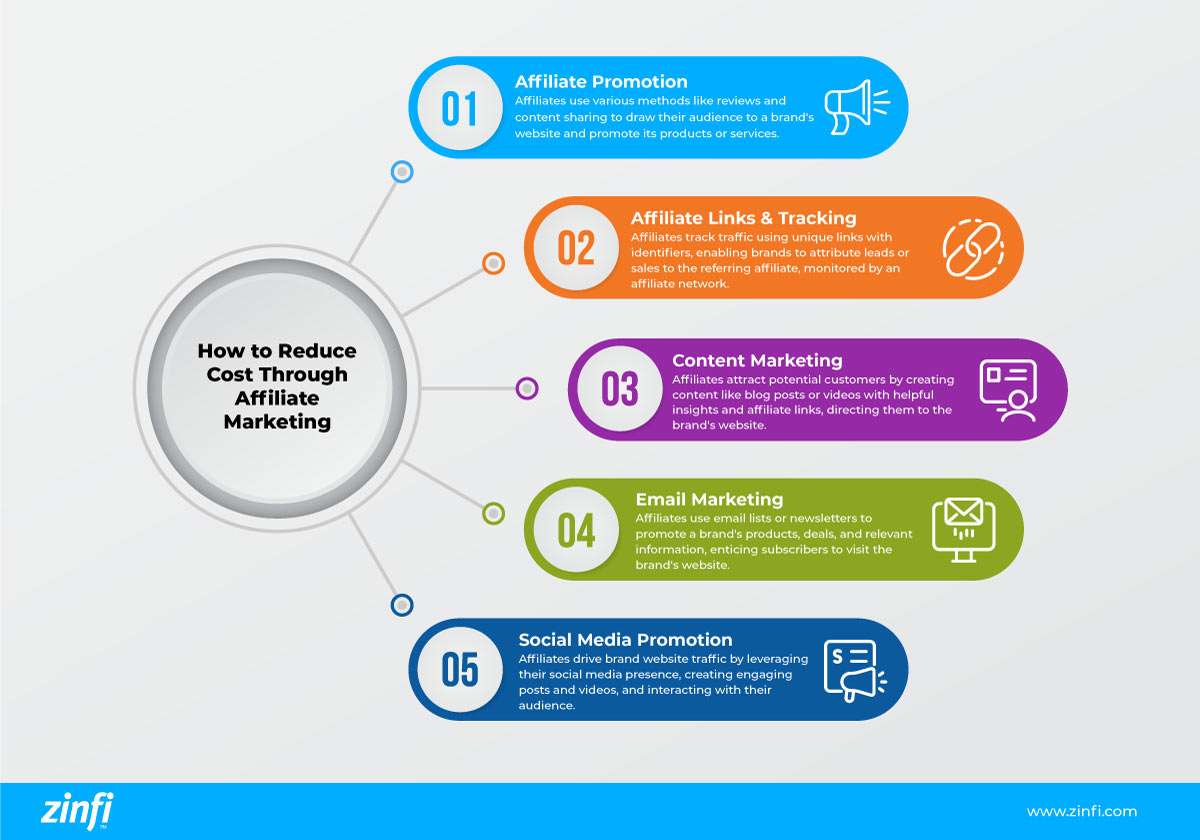
Now, let’s discuss how a company can reduce the cost of brand awareness and lead generation through affiliate marketing:
- Cost-effective pay-for-performance model: With affiliate marketing, a company only pays affiliates when they successfully generate leads or sales. This pay-for-performance model ensures that marketing expenses are directly tied to results. Rather than paying for advertising campaigns upfront without guaranteeing outcomes, businesses can allocate their budget to affiliates who deliver actual leads or sales. This helps reduce costs by eliminating ineffective marketing spend.
- Savings on marketing personnel: By establishing an affiliate network, a company can save substantial costs in hiring and maintaining a large marketing team. Instead of employing full-time marketers or outsourcing marketing campaigns, the company can leverage the efforts of affiliates motivated to promote the brand. This eliminates the need for extensive in-house marketing resources, reducing overhead costs.
- Reduced campaign and program expenses: Running traditional marketing campaigns and programs – such as print ads, TV commercials, or sponsored events – can be expensive. Affiliate marketing allows companies to rely on the promotional efforts of affiliates, who often have their platforms and audiences. The brand can benefit from increased exposure and lead generation without incurring the cost of running extensive marketing campaigns and programs.
- Scalability and flexibility: Because a company can engage with multiple affiliates simultaneously, affiliate marketing offers scalability, allowing for broader reach and increased lead generation potential without significant additional costs. The flexibility of affiliate marketing also enables companies to adjust their affiliate programs, commission rates, or promotional strategies based on performance and budget constraints, optimizing their cost-effectiveness.
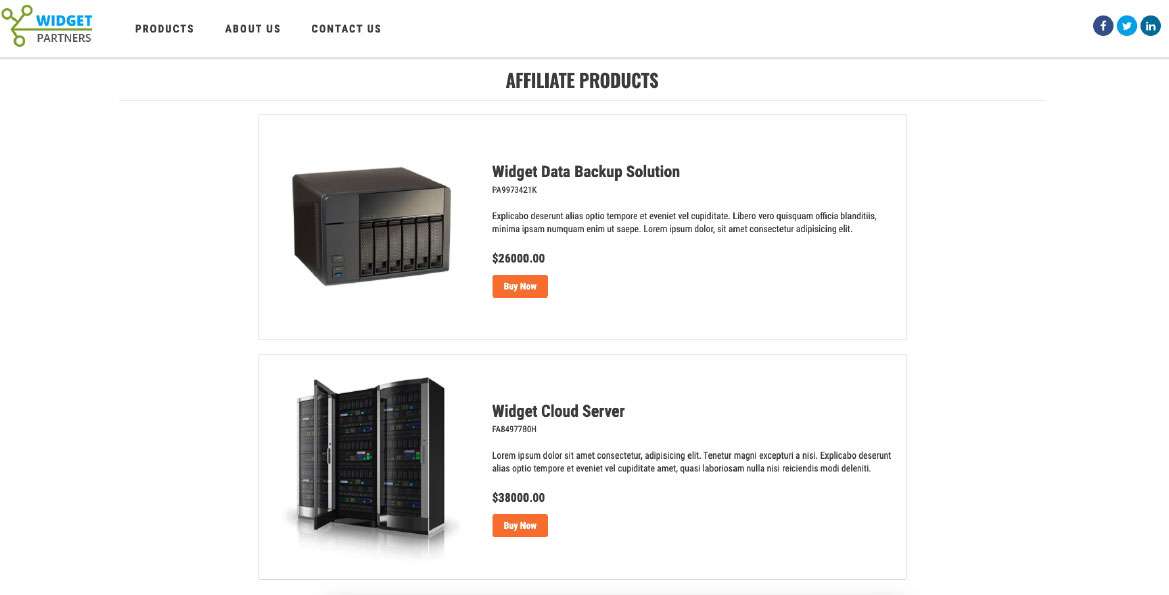
Expanding to Overseas Markets
Affiliate marketing can be invaluable for expanding into overseas markets and reducing the costs associated with international expansion. Here’s a detailed explanation of how affiliates can help with overseas expansion and immediately benefit the companies who partner with them:
- Indirect network promotion: By leveraging the promotional efforts of affiliates in overseas markets, companies can tap into local affiliates’ existing audience or customer base, gaining exposure and credibility in the new market. These affiliates can be individuals or organizations with established networks and influence in the target market.
- Fulfillment directly: A company may prefer to fulfill orders directly rather than relying on local distributors or intermediaries in specific scenarios. Affiliate marketing is beneficial in such cases, as it enables companies to reach customers indirectly through affiliates while still managing the fulfillment process themselves. This ensures control over the customer experience, product quality, and brand reputation while expanding into overseas markets.
- B2B partnerships: In the B2B sector, affiliates may be consultants, engineering companies, tech consulting firms, or domain experts with deep knowledge and connections in the target market. These affiliates can recommend and promote the company’s products or services to their existing network of clients or industry contacts. By leveraging these partnerships, companies can gain credibility and access to potential customers, facilitating entry into new markets.
- Global reach: One of the key benefits of affiliate marketing is its ability to provide a global reach. Companies can quickly expand beyond their geographic limitations and tap into new markets worldwide, penetrating international markets without requiring extensive physical infrastructure, local offices, or a large sales team. Affiliates function as trusted local representatives, connecting the brand with customers in different countries and regions.
- Cost reduction: Expanding overseas can involve expenses such as setting up local operations, hiring staff, establishing distribution channels, and marketing in unfamiliar markets. Affiliate marketing offers a cost-effective approach to international expansion. Instead of investing heavily in infrastructure and personnel, companies can leverage the efforts of affiliates already established in the target market. By paying affiliates based on their performance generating leads or sales, businesses can reduce upfront costs and mitigate the financial risks of entering new markets.
- Flexibility and scalability: Affiliate marketing provides flexibility and scalability, which are crucial for international expansion. Companies can easily adjust, expand, or contract the affiliate network based on market conditions or performance. This agility allows businesses to adapt to market dynamics, optimize their promotional efforts and scale their operations in overseas markets without significant fixed costs.
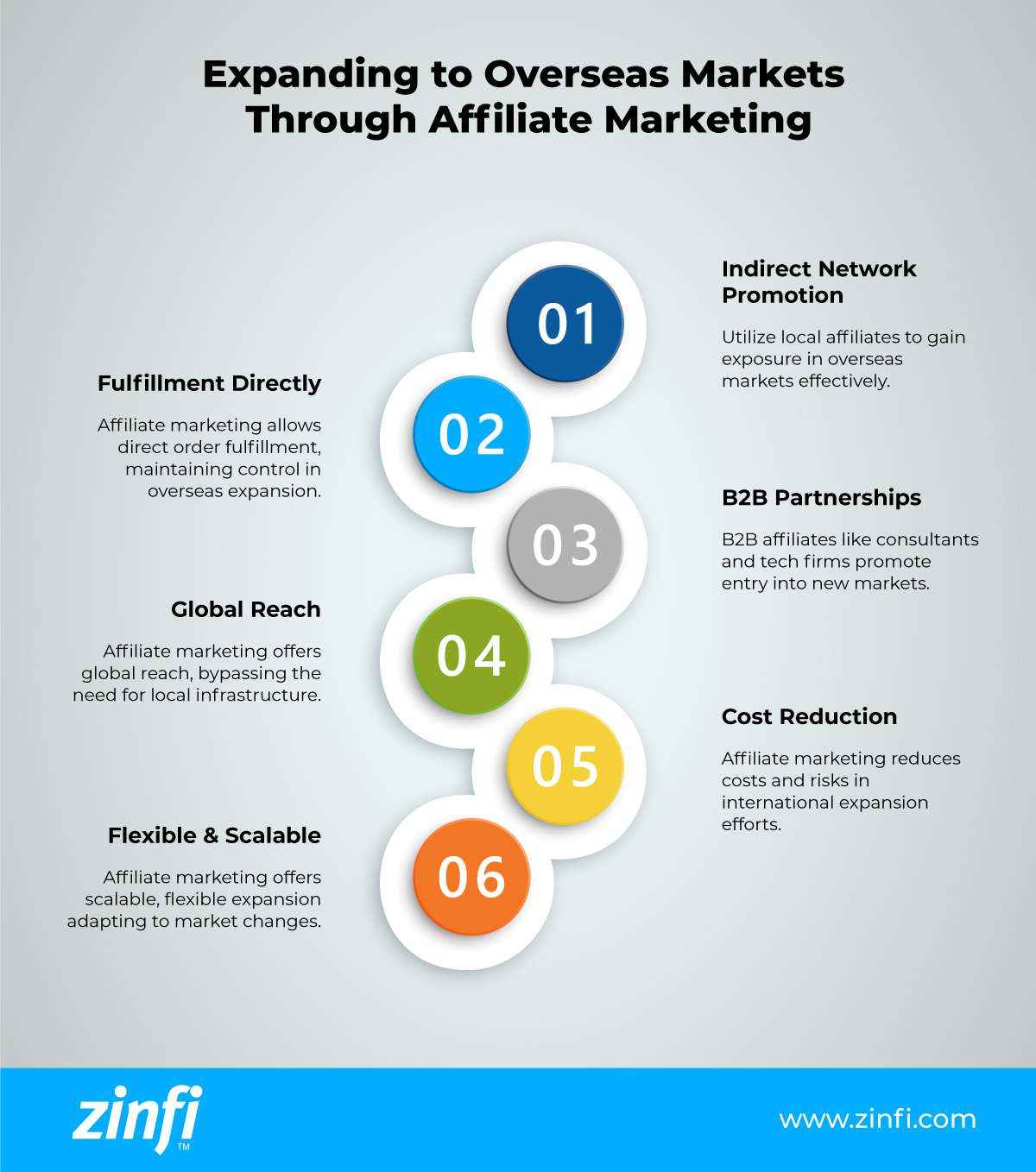
The Power of the Network Effect
One of the primary cost benefits of building an affiliate network can be attributed to the amplification factor and network effect in affiliate marketing. Let’s examine this concept in more detail:
- The amplification factor of a network: The amplification factor refers to a network’s ability to magnify a brand’s reach and impact. In affiliate marketing, the network consists of affiliates promoting the brand to their audiences. Adding more affiliates to the network exponentially increases the potential for brand exposure and visibility. Each affiliate acts as a node that amplifies the brand’s message and reaches a broader audience.
- Pervasive brand presence: As the network of affiliates grows, the brand becomes more pervasive. Its presence extends across multiple platforms, channels, and audiences as affiliates promote it to their respective networks. This widespread promotion helps to increase brand awareness, reach, and recognition among diverse audiences.
- Self-powering engine: Adding more affiliates to the network creates a self-powering engine. As affiliates join and actively promote the brand, they attract new affiliates, customers, and leads. This continuous cycle of affiliate recruitment and promotion leads to exponential growth in the brand’s reach and impact. The network becomes self-sustaining, driving organic growth for the brand.
- Network effect: The network effect is a unique aspect of affiliate marketing. As more affiliates join the network, the overall value of the network increases. The more affiliates there are, the more attractive it becomes for other potential affiliates to join. This positive feedback loop of growing participation strengthens the network and accelerates the brand’s reach.
- Organic growth and reaching new audiences: Through the network effect, affiliate marketing allows brands to grow organically. By leveraging the collective efforts of affiliates, the brand can reach new audiences that may not have been accessible through traditional marketing channels. Affiliates bring unique audiences and niche expertise, often enabling the brand to tap into new markets, demographics, and customer segments.
Leveraging Affiliate Marketing Automation Software
Now let’s consider the importance of affiliate marketing automation software in effectively managing and optimizing an affiliate network.
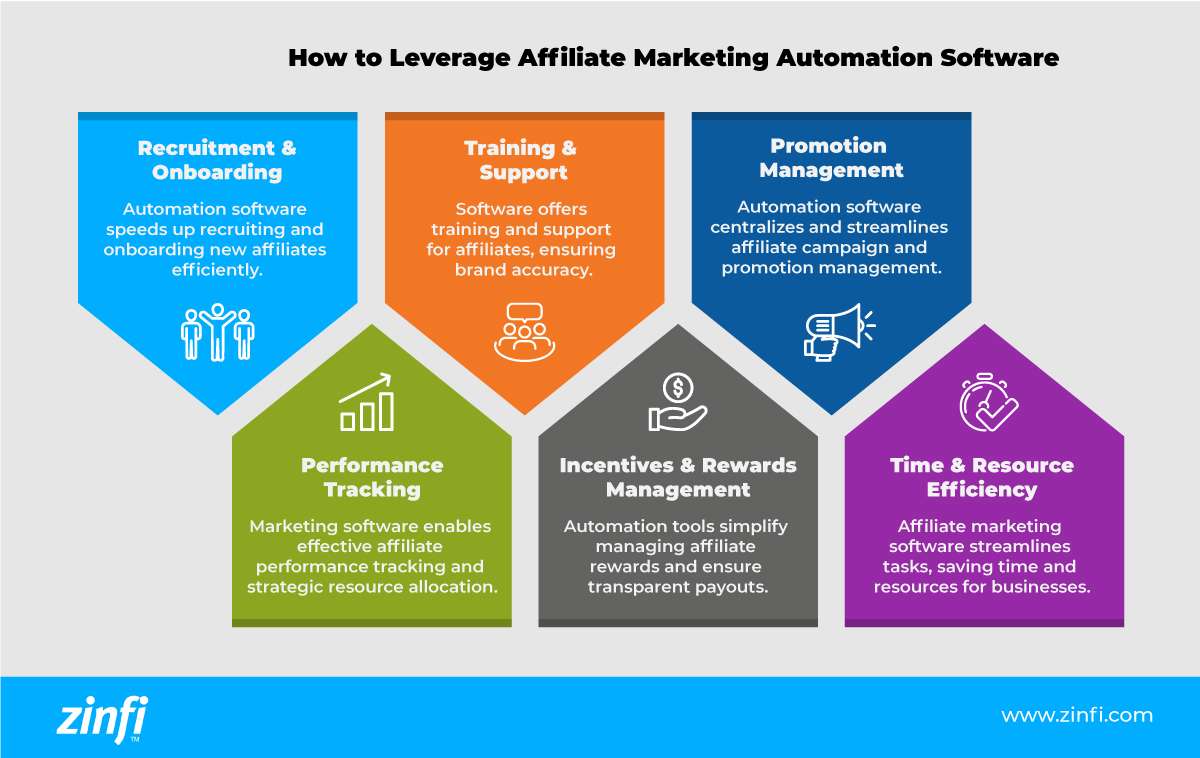
- Affiliate recruitment and onboarding: Affiliate marketing automation software can significantly accelerate the process of recruiting and onboarding new affiliates. Purpose-built platforms provide tools for automated application processing, personalized onboarding workflows, and easy affiliate registration. By automating these tasks, businesses can efficiently expand their affiliate network, save time and ensure a smooth onboarding experience for new affiliates.
- Training and support: Automation software can facilitate training and provide ongoing support once affiliates are onboarded. Platforms typically offer built-in training modules, educational resources, and communication channels to guide affiliates in promoting the brand effectively. This ensures that partners have the knowledge and tools to represent the brand accurately.
- Promotion management: Affiliate marketing automation software streamlines the management of promotions and marketing campaigns by offering a centralized platform where businesses can create and track various promotional materials, including banners, links, discount codes, and content assets. Automated tools enable companies to seamlessly distribute these promotional materials to affiliates, ensuring consistent branding and messaging across the network.
- Performance tracking and analytics: Effective affiliate management requires regularly monitoring and analyzing affiliates’ performance. Robust marketing automation software will offer tools for affiliate link tracking, conversion tracking, and detailed reporting. This allows businesses to measure key performance metrics, such as the number of clicks and conversions and the revenue generated by each affiliate. These insights into affiliate performance help companies identify top-performing partners, allocate resources effectively and fine-tune their marketing strategies.
- Incentives and rewards management: Partner marketing automation tools also simplify the management of affiliate incentives and rewards programs, making it easy for businesses to set up and automate commission structures, track affiliate earnings, and facilitate timely payout processes. Companies can use these tools to motivate affiliates, encourage them to pursue performance milestones and ensure accurate and transparent reward distribution.
- Time and resource efficiency: Using affiliate marketing automation software often saves businesses valuable time and resources, helping them streamline administrative tasks, eliminate manual workflows and provide a centralized hub for managing the affiliate network. This frees up business owners and marketing teams to focus on other core aspects of the business, such as product development, customer support, and strategic decision-making.
As you can see, affiliate marketing is a multi-faceted, powerful strategy for businesses looking to amplify their brand and reduce overall marketing costs while expanding their reach. Companies can harness the full potential of affiliate marketing by building solid relationships with affiliates, leveraging the network effect, and utilizing automation software to manage workflows more efficiently. As the digital landscape continues to evolve, affiliate marketing will likely become even more critical for businesses seeking a cost-effective, scalable, and impactful strategy on a global level.
For more information, please check this article.
Best Practices Guidebook
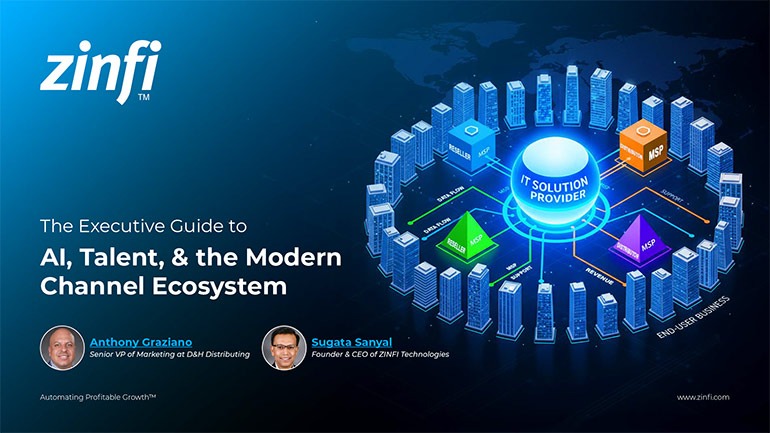 Modernizing Channel Marketing: AI and Ecosystem Enablement Best Practices
Modernizing Channel Marketing: AI and Ecosystem Enablement Best PracticesDownload for FREE
 The Channel’s Shift to Partner-Led With AI Best Practices
The Channel’s Shift to Partner-Led With AI Best PracticesDownload for FREE
 Hyperscalers, ISVs, and AI: Shaping the Future of B2B Software Distribution
Hyperscalers, ISVs, and AI: Shaping the Future of B2B Software DistributionDownload for FREE
 Definitive Guide to a Partner Ecosystem-First Sales Strategy
Definitive Guide to a Partner Ecosystem-First Sales StrategyDownload for FREE
 The Partner-Led Digital and AI Transformation Best Practices
The Partner-Led Digital and AI Transformation Best PracticesDownload for FREE
 Startup Talent Recruitment: Hiring Missionaries, Not Mercenaries
Startup Talent Recruitment: Hiring Missionaries, Not MercenariesDownload for FREE
 The Future of Partner Relationship Management with AI in Partnerships
The Future of Partner Relationship Management with AI in PartnershipsDownload for FREE
 Cybersecurity for the 99%: Strategies from the Frontline
Cybersecurity for the 99%: Strategies from the FrontlineDownload for FREE
 Mastering Partner Relationships: A Strategic Approach to Business Growth
Mastering Partner Relationships: A Strategic Approach to Business GrowthDownload for FREE
 Mastering Partner Relationship Management: Keys to SaaS Channel Success
Mastering Partner Relationship Management: Keys to SaaS Channel SuccessDownload for FREE
 Navigating the AI Revolution: Guide for Partners in the Microsoft Ecosystem
Navigating the AI Revolution: Guide for Partners in the Microsoft EcosystemDownload for FREE
 Mastering the Modern Buyers Journey: Sales Leader’s Guide to AI & Engagement
Mastering the Modern Buyers Journey: Sales Leader’s Guide to AI & EngagementDownload for FREE










